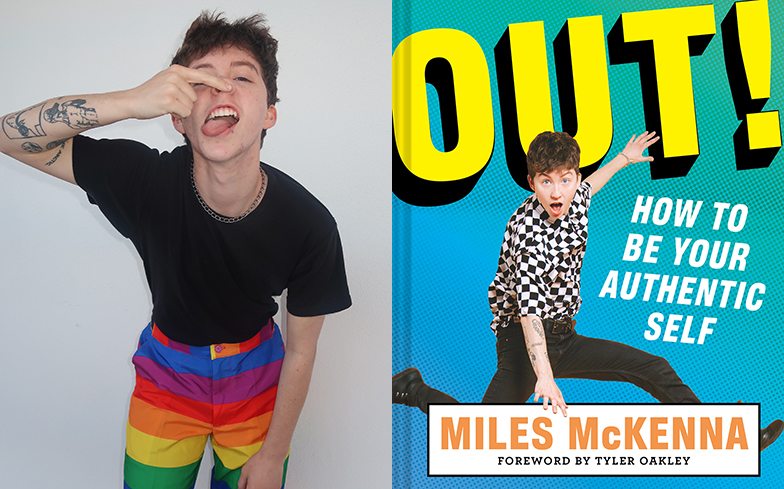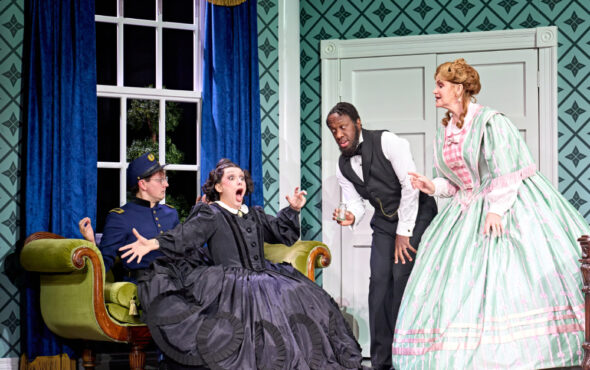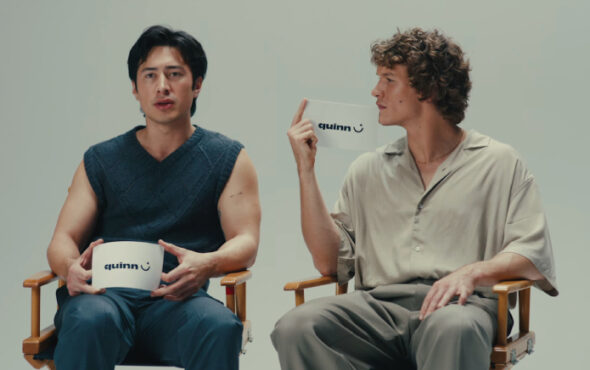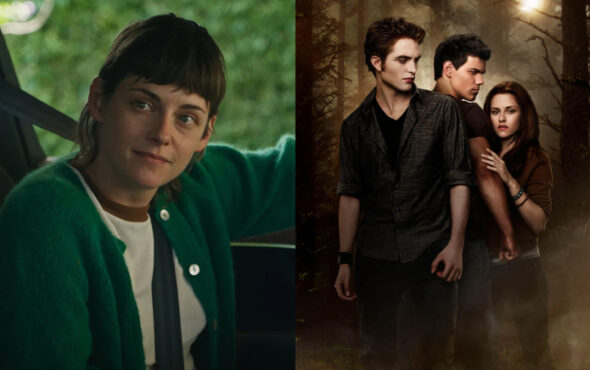
Coming out is rarely easy, but Miles McKenna is here to help.
The trans YouTube star has been helping young queer and questioning people discover who they are for years by documenting his journey online with openness and honesty – and now he’s releasing “the ultimate coming out survival guide” called Out!
“The internet was always my safe space and a place where I could go and be myself and meet others that are like-minded,” he tells GAY TIMES.
“My first ever coming out video on YouTube wasn’t me being like, ‘Hey, this is me, I hope you guys support me’, it was me being like, ‘I’m not living at home anymore because I can’t, so I’m sleeping on my friend’s couch’.
“Coming out with my gender identity was a really difficult thing, and having so much support, specifically from a younger generation that was also in the process of coming out, really helped me. Having that community saved me.”
As well as revealing the book cover, we spoke to Miles about his own coming out journey, why it’s so important to use people’s correct pronouns, and how a new generation of queer people and allies are paving the way for acceptance.
What was the inspiration behind the book?
Out! is a compilation of personal stories from my years of not only coming out to others but also coming into my own in a world that really demonises queerness, as well as advice I’d give my younger self or someone going through similar things. I’ve been making YouTube videos since I was 11 years old, it was always something fun to do after school and so I got older and I was really able to define my queerness and it became this lifeline and this space where I could get peer support and learn this language that I didn’t hear in my home town. So this is really just an extension of that, it’s a physical thing that you can share with your friends, you can show it to your parents. It’s a physical resource that can’t get deleted.
A portion of the profits are going to GLSEN. Why was that so important for you?
I’m obviously not high school or middle school age, but I know a lot of my audience is, and when I was growing up and going to school there wasn’t a Gay-Straight Alliance, there wasn’t really any support for LGBTQ identities. What GLSEN does is they really make it acceptable for teachers and students to put safety in the classroom, put LGBTQ history into the classroom, and you can even call them and they can send you stickers to put in the window to let kids know it’s a safe space. So I think having physical things like that, when I was going through my years of discovering who I was, I probably would’ve come out a lot sooner if there would’ve been support like that at my school. So it’s really important to me that my audience could get that, or at least know it exists.

You’ve spoken in the past about how you didn’t have the easiest coming out experience. How did you get through that and into a better place?
That just comes with time, and also community support, the internet was always my safe space and a place where I could go and be myself and meet others that are like-minded. I mean my first ever coming out video on YouTube wasn’t me being like, ‘Hey, this is me, I hope you guys support me’, it was me being like, ‘I’m not living at home anymore because I can’t, so I’m sleeping on my friend’s couch, here’s who they are’. So it was really a chance for me to be 100% me, and it worked out in a positive way because people came out of the woodworks who really loved me for me, and the internet played a big role in that.
It sounds like the idea of finding a chosen family, which a lot of queer people have to do.
Yeah, and historically, especially for trans people, you really need that peer support. That’s how you find that information, it’s all through word of mouth. The internet has been able to explode that where kids can pop their small bubble of whatever town they live in or whatever school they go to, and access these people who really see them for who they are.
Documenting your journey on YouTube is a really powerful thing to do, but I also imagine it can be quite scary at times, having the world follow your life in that way. How do you deal with any backlash or negativity you’ve faced?
It’s a learned thing, right? I have the armour of having so much support and being an older person in my coming out journey and my transition. Like, if you don’t like trans people or queer people, I can’t help you, you know what I mean? I’m not the channel for you. So i think it’s a learned thing, not everyone is gonna like you, but in turn you’re not gonna like everyone else and that’s totally fine. Put more focus on the people who are good to you, and who you enjoy being around, and not the reverse.

There are a lot of people who do look up to you and are inspired by you. What kind of positive responses have you had?
I went on my first ever nationwide tour just a few weeks after I came out as trans, and it was this whole thing of, ‘Should I wait?’ I was doing a lot in the queer space, and there were a lot of things attached to me and my likeness, so I was just like, ‘I need to come out now because there are the most amount of people watching, and I also need to do it for me’. It was really cool to see so many people so soon after coming out, and the biggest thing has been meeting kids who are really similar to me, from somewhere else living a completely different life, but we have so many similarities. It’s like, ‘Wow, I felt so alone for so long, and there are people the same as me but on the other side of the country’. The parents as well, a lot of my audience members are really young so they’ll bring their parents to different events I speak at, and meeting them is really cool, that’s always a really inspiring experience.
Last year you spoke out about being referred to with the wrong pronouns during a panel at VidCon. It should be obvious, but some people still don’t understand or refuse to learn; why is it so important that people use correct pronouns and names?
It’s just a respect thing. When that happened, it was in front of hundreds of young queer and trans youth and I saw it on their baby faces when something was said, and they looked at me and I was like, ‘These are kids who potentially get misgendered by people they know every single day, and the way I react to this situation, they will take with them forever and it’s gonna be a big part of their journey’. So I tried to make it a teaching moment, it happened, correct it, let’s move on. But yeah, it’s just a respect thing. Call people by who they are and what they tell you their name is and what their pronouns are. I don’t understand why people, specifically for trans stories, why they need to say who they were in the past to validate the present. It’s like, ‘Here’s who they are, and this is who they used to be’. It’s not like that. It’s just a respect thing. Just call people by their name!
Transitioning and coming to terms with your identity is such a personal thing. How has your experience with fame and fandom impacted this journey? Has it helped, or made it harder?
It’s been super great having so much support. When I was growing up I was watching a lot of YouTubers come out and the consensus was typically, ‘I was really scared to come out, and then I did, and it was fine, it gets better!’ I was always watching that growing up, and when I came out it was not the same story for my sexuality, it was a really negative thing, a whole 180 with my family dynamic, and I’d hear the saying, ‘It gets better’, and be like, ‘When? When is that gonna happen to me?’ So that really stopped me from trying to figure out anything or be open about myself anywhere because of the negativity I got from people close to me. So coming out with my gender identity was a really difficult thing, and having so much support specifically from a younger generation that was also in the process of coming out really helped me. Having that community saved me.

Trans people have had increased visibility recently, shows like Pose and celebrities like Laverne Cox for example, but there has been an increase in anti-trans rhetoric and violence. How do you stay positive through this, and how can others do the same?
I mean, I don’t experience the same type of negativity that my other trans siblings do, because I am white, I am male, I am very far along with my transition and I am very binary, so really I operate in this world as a white guy – it’s different for me than it is for other people. For me, it’s about naming that and knowing the privilege I have, and then using this platform to lift up other voices and giving resources. In the book there are a lot of resources or spaces that I’ve frequented to get that peer support, to access mental health services, or even spaces I didn’t access that I would’ve loved to, they’re all there so people can live their best lives.
Where do you see the trans – and broader LGBTQ rights movement – going next? What more needs to be done?
I think we have a really cool generation growing up with the internet and they’re able to access a language that a lot of kids couldn’t hear before. A lot of kids are coming out because there is so much support online, so what I think we’re gonna see in the future is a lot of queer and trans parents who are raising a new generation who are way more accepting and self-aware – I think that’s the biggest thing for me, the fact that someone knows who they are at such a young age, that’s a crazy thing. There are 12 year olds who know exactly who they are, and that’s the type of self-aware that I did not possess, and I think it’s really, really cool.
I want to end on a positive question. While being queer can come with hardships, it’s also a really special thing. What are some of your favourite things about being queer?
Definitely the community. Before I had the right language to put to it, I felt weird and awkward, and nothing really fit me in a physical and emotional sense. I wasn’t in the dating scene, everything just felt really strange and I didn’t really know why. So queerness to me is all I’ve ever known. It’s cool having this community and that support, especially with Pride events, that’s something I never got to do when I was younger and when I got into my twenties I was able to start experiencing that. It’s a nice reminder that we’re here, and we’ve always been here.

Out! hits shelves May 26, 2020 and is available to pre-order here. Miles McKenna is represented by Fullscreen and UTA.



